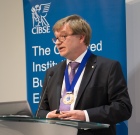CIBSE president stresses engineers’ role in addressing energy issues

Building-services engineers have a key role to play in addressing the ‘energy trilemma’ faced by policy makers across the world. That was one of the underlying messages from CIBSE’s president for 20013/14 in his presidential address. The energy trilemma embraces the need to improve security of supply, reduce energy costs to consumers and business, and reduce carbon emissions to minimise the increase in global average surface temperatures.
He explained, ‘While CIBSE is not directly involved in questions of energy supply and we have limited influence on these decisions, we most certainly can influence the fact that buildings and their services play a very large part in a nation’s energy consumption and carbon emissions. Balancing the economic and environmental imperative will required careful engineering, genuine collaboration and effective management.’
He reminded his audience that services in buildings are responsible for 40 to 45% of primary energy demand and carbon emissions in most developed economies. ‘Our institution has the knowledge and skills to deliver significant improvements in energy and resource efficiency without compromising building performance.’
He asked the question, ‘How do we ensure that our buildings continue to improve?’
His answer was, ‘This must begin with our sector becoming joined up and giving the Government good reason to believe that we are serious about delivering what our clients require,
Nick Mead expressed concern that while through regulatory control the Government has the power to mandate more efficient buildings, it has tried for many years without much evidence of success.
He observed, ‘To improve building performance, we must consider whole life. High-performance buildings tend to start off with shape, orientation and facade design.
‘Many buildings are still being constructed with few, if any, passive measures to reduce heat loads.
‘Managing these heat loads with mechanical plant will incur increasing cost over the whole life of the building. We cannot continue to divorce design and construction from operation.’
He called for the industry to pull together and ‘put its head above the parapet’ by working collaboratively across the supply chain, and considering the whole lifecycle of the building to deliver outstanding projects — avoiding short-term, siloed thinking.








